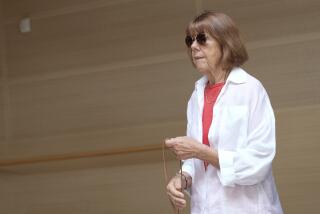New Disclosure in Ex-Mistress’ Testimony : Von Bulow Waited Hours to Get Wife Help, Trial Told
- Share via
PROVIDENCE, R.I. — Claus von Bulow’s former mistress testified Tuesday that he told her he watched his wife for hours without summoning help after she lapsed into a coma in 1979, but when she was on the point of death, “he couldn’t go through with it.”
“He watched her knowing she was in a bad way all day, and watched her and watched her,” Alexandra Isles said in testimony that followed her dramatic return from Europe on Monday.
“And, finally, once she was at the point of dying, he said that he couldn’t go through with it,” she said.
The socialite and former soap opera actress, who was the final prosecution witness, said that she had not mentioned this conversation when she testified at Von Bulow’s first trial because she “couldn’t bear to think about it.”
Von Bulow Reaction
As she testified, Von Bulow, who faces 40 years in prison if convicted on the two attempted-murder charges, intermittently shook his head from side to side.
Isles, 39, was a key prosecution witness at Von Bulow’s first trial on charges he induced his wife’s two comas by trying to murder her with insulin injections.
Martha (Sunny) von Bulow, 53, recovered from the 1979 coma, but doctors say that a coma she suffered a year later is permanent.
Isles testified, as she did at the first trial, that she had given Von Bulow a deadline to divorce his wife.
‘Free Man After Christmas’
She said that, prior to the first coma, he had told her “he would be a free man after Christmas . . . because he would have come to an understanding about divorce with his wife.”
Isles said Von Bulow told her that the night before the first coma he and his wife had a long argument about a possible divorce and that he watched her drink alcohol-spiked eggnogs and take a barbiturate.
She said he told her that the next day he watched his wife deteriorate and then finally called a doctor. That supports earlier testimony of a family maid that Von Bulow did nothing for hours as his wife suffered.
Under cross-examination by defense attorney Thomas P. Puccio, Isles revealed that, after the first trial, she wrote Von Bulow a letter suggesting they resume their relationship.
“When I wrote that letter, I didn’t know what I was doing,” she said.
Isles also said she was ashamed to admit that she continued to see Von Bulow through 1980, even though she had suspicions about his wife’s first coma.
She denied defense assertions she was trying to let Martha von Bulow know about the relationship, and perhaps speed up a decision on a divorce, by dropping off presents at the couple’s Manhattan apartment.
Isles said Martha von Bulow was “not a housewife who would pick up things at the front door.”
The judge refused to permit the state to present its last witness, G. Morris Gurley, Martha von Bulow’s longtime banker and estate manager. He had testified at the first trial about how much Von Bulow would gain upon the death of his wife.
During a hearing on a defense motion to limit any new testimony, Isles said that she had not provided the information at Von Bulow’s first trial because she “couldn’t bear to think about it” and was not directly asked.
“My purpose in the trial in ’82 was to answer in the most minimal way,” Isles said. “I couldn’t cope with what I didn’t say. I couldn’t bear to think about it.
“It was (his) behavior that troubled me . . . and I didn’t want to recognize it for what it might have implied,” she said.
Isles left for Europe two months ago, saying that she wanted to avoid testifying because she knew it would generate intense publicity. But after a state request to use her 1982 testimony was rejected, prosecutors successfully negotiated with her New York attorney to get her back.
Isles’ testimony is critical to the state’s charges that Von Bulow wanted his wife dead so he could inherit $14 million of her $75-million Pittsburgh utilities fortune and be free to marry Isles.
Before Isles took the stand at the retrial, Superior Court Judge Corinne P. Grande denied a defense motion to limit any new testimony on grounds that the defense knew nothing about it.
Grande said that the testimony was permissible because the state was not withholding it from the defense team.
“It’s quite clear that this witness at the first trial consciously excluded certain testimony. She testified selectively for reasons she felt were compelling or significant,” Grande said.
More to Read
Sign up for Essential California
The most important California stories and recommendations in your inbox every morning.
You may occasionally receive promotional content from the Los Angeles Times.













